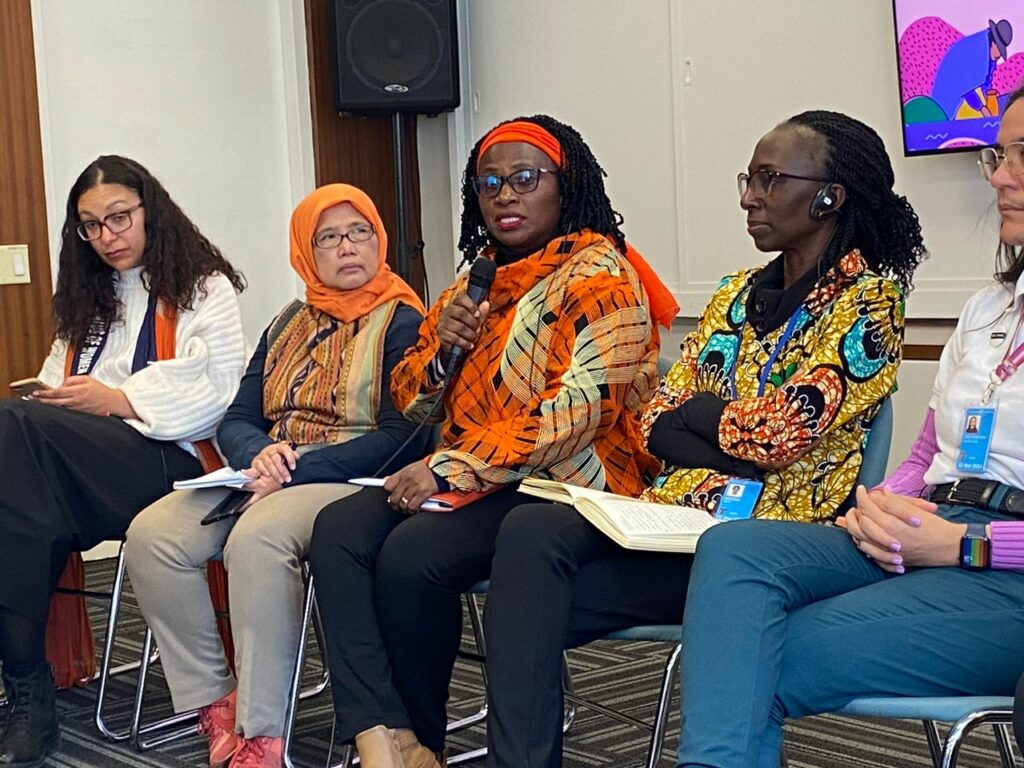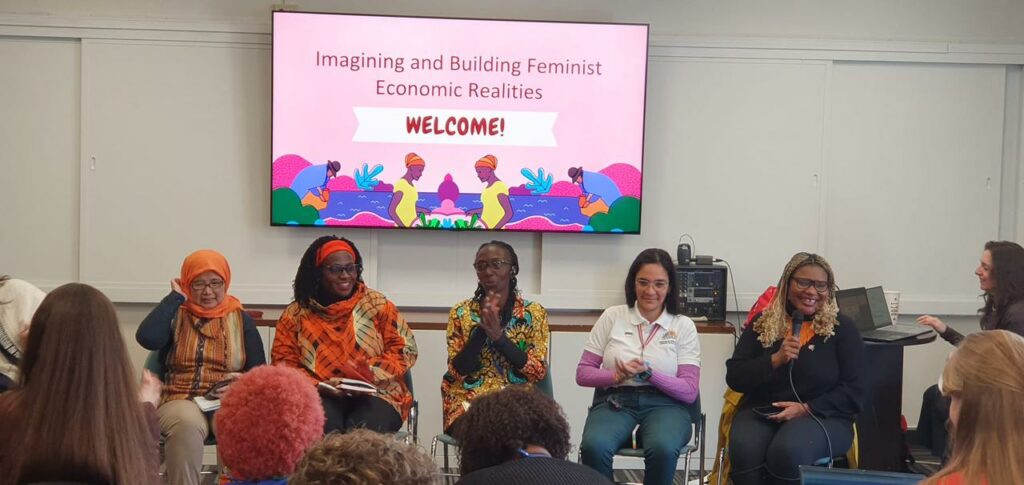Feminist economic realities can take many forms because they evolve around the context and needs of the people in a particular place and time. These realities also prioritise equality and justice for all. Count Me In!’s event at CSW attracted long-due attention to these feminist economic realities, prompting funders and INGOs to rethink the concepts of economic empowerment, intersectionality, and equality.
Feminist economic realities directly challenge unjust economic systems. They provide examples and pathways of alternatives that are people-centred, holistic, based on rights, values and justice, and understand the dimensions of care, pleasure, and managing life in general. Feminist economic realities are not driven by values that only centre on economic growth, capitalist accumulation, and models of empowerment that lead to economic individualism. Held on Friday, 22nd March, our event at CSW68 Imagining and Building Inclusive Feminist Economies* brought together four experiences of such feminist economic realities in action. The session was moderated by Faye Macheke, Co-Executive Director at AWID.
Faye: “Feminism has been really good in criticising the current economic system. Here we want to lift up the work of those already building the feminist economic realities we need. Another world is possible, and she is on her way!”


Speaking first, Rosalba Díaz Crisóstomo from the Dominican Republic shared the challenges and successes faced in establishing COOPDIVERSA, a cooperative movement founded during the pandemic for LGBTIQ+, feminists and other structurally excluded people. After navigating national-level legal parameters that would allow the cooperative to operate as a safe space for the community, COOPDIVERSA now provides collective economic autonomy for its members through savings and credit facilities, along with other services.
Rosalba: “There are so many technical procedures to start a cooperative. So we, as LGBTQIA and the feminist community in the Dominican Republic, had to learn everything about those judicial frameworks and regulations to be able to get the approval to start our own cooperative. That has been the biggest challenge so far and our biggest success.”
The event also heard from Agnes Mirembe from Action for Rural Women’s Empowerment (ARUWE) in Uganda on the issues faced by women in rural communities around energy justice. Agnes shared ARUWE’s experiences of spearheading renewable energy through sustainable green technologies that women are able to own and control themselves, and the importance of taking the fight for energy justice and climate action to the national and regional policy level.
Romlawati from PEKKA, a member of the Power Up! consortium, then shared experiences of the organisation’s decades of cooperativism working with the poorest women-headed families across 27 provinces of Indonesia, including in post-conflict areas. PEKKA has been providing cooperative-led savings and loans, along with support in the production of local goods and empowerment of women as organisational and community leaders. PEKKA cooperativism works with women’s lived realities to challenge and provide collective alternatives to the existing legal frameworks that disadvantage marginalised women economically. This includes targeted advocacy at the local and national levels.
Rom: being a woman-head of family in Indonesia is not legally recognised, and theajority of PEKKA women only graduate from elementary school. Organisational and community leadership allows women to develop individually and collectively.
Elliot Orizaarwa from the Women and Girl Child Development Association (WGCDA) in Uganda then spoke on the association’s battle for women’s land justice in rural communities. Elliot noted that less than 20 per cent of women own land, and even those don’t have control over the land, as with customary laws and marital hierarchies allowing husbands to often determine access. In response, WGCDA brings women together to collectivise land and farming where possible. Together they advocate for more land by attempting to influence government structures to break away from the monopoly ownership of land by the wealthy in the country.
Elliot: “We need land rights for women in Uganda. Women have no rights, no control, no access. Our message should be: we won’t continue working like this any longer.”
The event then explored some of the key areas that had arisen from the sharing of these experiences of feminist economic realities. That included working both within and outside existing legal frameworks. For COOPDIVERSA, for example, this included having to fight for the right to be a closed cooperative within the Dominican system as a means of ensuring that the needs of the community are prioritised. For PEKKA, this remains an ongoing area of struggle that they continue to remain resilient, as Indonesia does not legally recognise single-headed families and cooperatives are not viewed as movements but only as entities. Both ARUWE and WGCDA are also continuing to find ways to address financing needs within their communities and the importance of engaging with areas such as feminist budgeting, which is crucial to sustain the efforts.


Agnes: “To make feminist economic realities work, access to financing and women in leadership are key!”
Feminist economic realities have been around for a longer time, but there is not much awareness or visitability of how these realities are helping create better and just communities. There is a clear need for more such experiences to be showcased in spaces like CSW. The event closed with a promise of further work on feminist economic realities, including the collation and collection of stories and experiences from across the Count Me In! consortium of what feminist economic realities in action look like.
*This year at CSW, the Count Me In! (CMI!) consortium held a parallel event at the NGO Forum Imagining and Building Inclusive Feminist Economies. The event drew on the work around feminist economic realities (FERs) that CMI! has prioritised for the coming years as part of its commitment towards advancing economic justice. Read more about our work in this area.